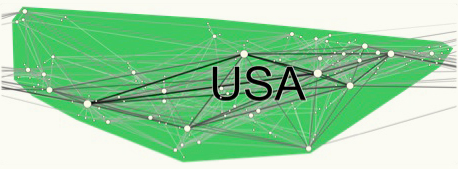
SDSC’s CAIDA Internet Research Group Awarded Cybersecurity Contract
Department of Homeland Security Announces 34 Contracts
By:
- Jan Zverina
Published Date
By:
- Jan Zverina
Share This:
Article Content
The Cooperative Association for Internet Data Analysis (CAIDA), based at the San Diego Supercomputer Center (SDSC) at the University of California, San Diego, has been awarded a contract for cybersecurity research and development by the Department of Homeland Security’s Science and Technology Directorate (DHS S&T).
The award to CAIDA is one of 34 contracts recently announced by the DHS S&T to 29 academic and research organizations for research and development of solutions to the nation’s cybersecurity challenges. The contracts were awarded by the department’s Cyber Security Division (CSD) under Broad Agency Announcement (BAA) 11-02, which solicited proposals covering 14 technical topic areas aimed at improving security in federal networks and across the Internet, while developing new and enhanced technologies for detecting, preventing, and responding to attacks on the nation’s critical information infrastructure. A full list of awardees can be found here.

A semi-geographic representation of the XO Communications (AS2828) U.S. city-level network. CAIDA, SDSC/UCSD.
The CAIDA Internet Mapping Project will span 36 months and aim to help improve the nation’s ability to identify, monitor, and model critical Internet infrastructure.
The first phase of CAIDA’s Internet topology mapping project will focus on increasing the completeness, accuracy, and annotation richness of global Internet infrastructure maps. To increase completeness, CAIDA will continue to grow its distributed Archipelago (or Ark) active-measurement infrastructure that currently consists of 62 monitors deployed in 29 countries on six continents. Researchers will use Ark to collect measurements from probes sent to all of the routed IPv4 prefixes on the Internet, and also will experiment with recently developed techniques that improve the efficiency and coverage of IP-level topology probing.
To increase both completeness and accuracy, CAIDA will explore and develop additional topology data sources, and use them to improve confidence in the presence or to refute the existence of specific links in the derived graph of Internet connectivity. To enrich annotations, CAIDA researchers will test and validate recently proposed techniques for creating an intermediate level of aggregation of the router-level graph into Points-of-Presence (PoP-level) maps.
The second phase of the project will focus on implementation techniques investigated or designed during the first phase, including the installation of new or upgraded Ark monitors, populating a database of historic Internet topology data, and further development of topology-on-demand probing functionality. The project will result in periodic release of Internet Topology Data Kits that can be used by network researchers for studying the structure of the Internet at the router level.
The third phase will include demonstration of these new technologies and systems in realistic operational environments, while continuing to add new and replace obsolete Ark monitors. CAIDA also will extend the AS Rank service that ranks Autonomous Systems (organizations often referred to as Internet Service Providers that provide transit and routing of data on the Internet) based on the inferences about their business relationships and peering agreements derived from the collected trace data. The service will include comprehensive visualizations of AS- and router-level connectivity both in the logical network and geographical space.
Share This:
You May Also Like
Stay in the Know
Keep up with all the latest from UC San Diego. Subscribe to the newsletter today.


